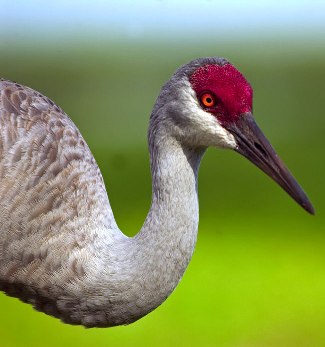 I saw an excellent presentation last week about two topics that have already graced this blog: Sandhill Cranes and the Platte River. The program was presented by Ken Strom, Deputy Director for Audubon Colorado, and Stephen Jones, author of Sandhill Cranes: The Wonder and Majesty of their Migration.
I saw an excellent presentation last week about two topics that have already graced this blog: Sandhill Cranes and the Platte River. The program was presented by Ken Strom, Deputy Director for Audubon Colorado, and Stephen Jones, author of Sandhill Cranes: The Wonder and Majesty of their Migration.
The two topics, of course, go hand in hand. The Platte River in central and western Nebraska is the premier spot to see the cranes during their spring and fall migrations. Cranes can be spotted in lots of places throughout the continent, but they come by the thousands to the Platte River.
Mr. Strom spoke of the work that Audubon is doing in restoring some sections of the Platte by clearing out tall cottonwoods that have been allowed to take root in the river over the last several decades due to water diversion. The natural pattern of flooding, which historically scoured any tall vegetation from the river, has been altered and has affected where the cranes are able to land and feed. Clearing the trees mechanically is the only way to restore the proper river habitat.
Mr. Jones talked of his favorite places in Nebraska to see the cranes and the inspiration that cranes can provide as a wildlife viewing experience. The sound of so many birds alone is certainly enough to inspire awe, and the rugged, hilly setting of western Nebraska provides the perfect scenic backdrop.
Given such a spectacular event as the migration of the Sandhill Cranes, it’s hard not to think about what the American Prairie Reserve calls the Great Plains: The American Serengeti. While it’s true that much of its wildlife splendor has been subdued in the last 200 years, it’s exciting to know that the Great Plains still inspires with things that remain much as they have been for eons, and the migration of the Sandhill Cranes is one of those things.


2 Responses
This is such good news.It is always great to see people doing things that restore the habitat of animals/birds instead of destroying them,all in the name of progress.
True that. It’s nice to see wildlife take precedence from time to time.